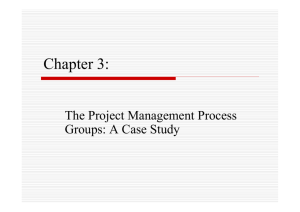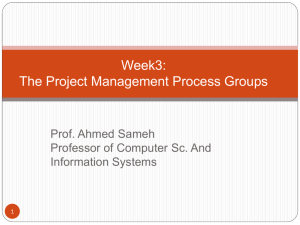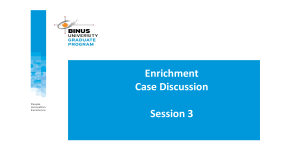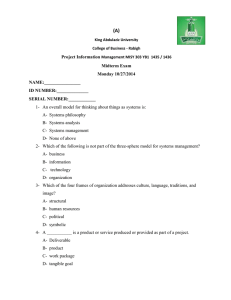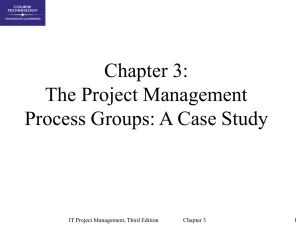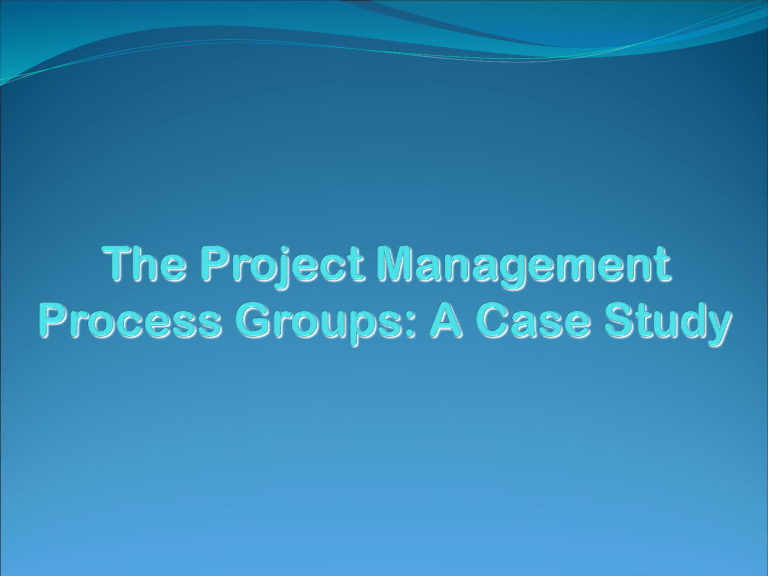
Learning Objectives Describe the five project management (PM) process groups, the typical level of activity for each, and the interactions among them Understand how the PM process groups relate to the PM knowledge areas Discuss how organizations develop information technology PM methodologies to meet their needs Project Management Process Groups A process is a series of actions directed toward a particular result Project management can be viewed as a number of interlinked processes The project management process groups include: Initiating processes Planning processes Executing processes Monitoring and controlling processes Closing processes Percentage of Time Spent on Each Process Group Mapping the Process Groups to the Knowledge Areas You can map the main activities of each PM process group into the nine knowledge areas using the PMBOK® Guide, Fifth Edition Note that there are activities from each knowledge area under the planning and monitoring and controlling process groups Developing an IT Project Management Methodology Just as projects are unique, so are approaches to project management Many organizations develop their own project management methodologies, especially for IT projects A methodology describes how things should be done; a standard describes what should be done PRINCE2, Agile, RUP, and Six Sigma (DMAIC, DMADV) provide different project management methodologies Case Study: JWD Consulting's Project Management Intranet Site This case study provides an example of what’s involved in initiating, planning, executing, controlling, and closing an IT project Note: This case study provides a big picture view of managing a project Project Pre-initiation It is good practice to lay the groundwork for a project before it officially starts Senior managers often perform several pre-initiation tasks, including the following: Determine the scope, time, and cost constraints for the project Identify the project sponsor Select the project manager Develop a business case for a project Meet with the project manager to review the process and expectations for managing the project Determine if the project should be divided into two or more smaller projects Business Case Business Case (contd) Business Case (contd) Project Initiation Initiating a project includes recognizing and starting a new project or project phase The main goal is to formally select and start off projects Stakeholder Register Stakeholder Management Strategy Contents are often sensitive, so do not publish this document. Project Charter A project does not exist until the charter is created. When the charter exists, the project begins. The charter contains a high level description of the project and its objectives, and maybe an overview of the business case. The most important aspect of the charter is that it grants to the project manager the authority to spend money and use the organization's resources to accomplish project activities. Usually the project manager, senior managers, sponsors, and clients all sign the project charter. A project charter is not used to manage changes that occur during a project. If large-scale project changes make the charter obsolete or outdated, a new charter should be issued. If a project manager feels the urge to update the charter, this is a sign that the current project is obsolete—a new project is required, not a modification of the existing one. Project Charters Project Charters Kick-off Meetings It’s good practice to hold a kick-off meeting at the beginning of a project so that stakeholders can meet each other, review the goals of the project, and discuss future plans Kick-off Meeting Agenda Project Planning The main purpose of project planning is to guide execution Plan must be realistic and useful Every knowledge area includes planning information Key outputs included in the JWD project include: A team contract A project scope statement A work breakdown structure (WBS) A project schedule, in the form of a Gantt chart with all dependencies and resources entered A list of prioritized risks (part of a risk register) Team Conduct JWD Consulting Intranet Site Project Baseline Gantt Chart List of Prioritized Risks Project Executing Usually takes the most time and resources to perform project execution Project managers must use their leadership skills to handle the many challenges that occur during project execution A milestone report can help focus on completing major milestones Project Executing Part of Milestone Report Project Monitoring and Controlling Involves measuring progress toward project objectives, monitoring deviation from the plan, and taking correction actions Affects all other process groups and occurs during all phases of the project life cycle Outputs include performance reports, change requests, and updates to various plans Project Monitoring and Controlling Project Closing Involves gaining stakeholder and customer acceptance of the final products and services Even if projects are not completed, they should be closed out to learn from the past Outputs include project archives and lessons learned, part of organizational process assets Most projects also include a final report and presentation to the sponsor/senior management Project Closing Lessons Learned Summary The five project management process groups are initiating, planning, executing, monitoring and controlling, and closing You can map the main activities of each process group to the nine knowledge areas Some organizations develop their own information technology project management methodologies The JWD Consulting case study provides an example of using the process groups and shows several important project documents
